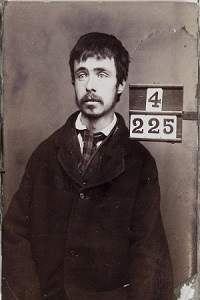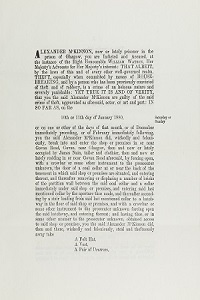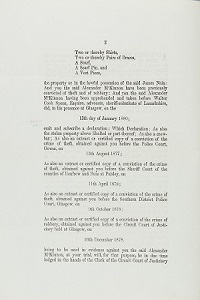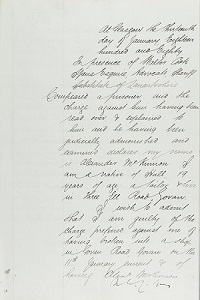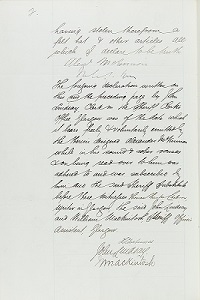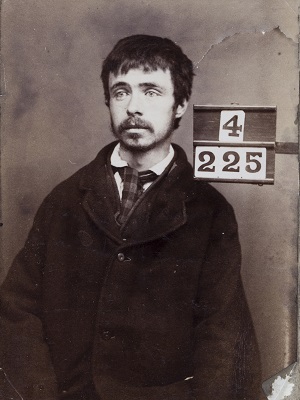
Alexander McKinnon
Admitted 1881. Housebreaking and Theft
A native of Hull, Alexander is the youngest prisoner-patient in the exhibition, aged just 18 years on admission. Like all the others he was in a manual occupation, which he gave as a tailor. With four previous convictions for housebreaking and theft dating back to August 1877, Alexander was described as 'an old offender'. He received a seven year sentence in May 1880, after being caught red-handed in a shop in Glasgow wearing eight stolen items of clothing. While many prisoner-patients had committed violent acts, nearly half of all admissions to Perth Criminal Lunatic Department (CLD) were for theft.
Initially sent to Woking Invalid Convict Prison in Surrey, he was transferred to Perth CLD in July 1881, with 'imprisonment' recorded as the immediate cause of his madness. The brief summary that accompanied him from Woking ended: 'A weak imbecile requiring constant supervision'.
The truth of this verdict became clear from the case notes during the six years he spent at Perth. 'A weak silly lad. Says that he continually sees Jesus Christ, who is working in the garden with a wheelbarrow and which causes him great annoyance though it may eventually be for his good; very absent minded...Filthy in his habits and often wet at night. Kneeling down crying 'Blessed divinity'. Breaks glass nearly every day...bites himself severely upon hands & lips...frequently injuring himself seriously by hitting his head against walls & doors & thumping it on the floor. Once or twice tried to strangle himself...frequently assaulting those near him'.
Alexander's case notes conclude: 'Form of insanity: dementia'. About a fifth of Victorian admissions to the CLD were diagnosed with dementia (the largest category, half, were maniacs). Dementia meant something quite different from the age-related neuro-psychiatric disorder we presently associate with 'senile dementia': a deterioration of mental faculties to the point of impairing social functions. In the 19th century it could be any psychotic illnesses involving progressive deterioration. It included patients with cognitive difficulties, but also psychotic ones who were not behaviourally overactive enough to be described as manic.
In May 1887 Alexander was sent to Glasgow prison 'for disposal' (discharge).
Photograph of Alexander McKinnon taken from the Criminal Lunatic Department Case Book
Credit: Crown copyright, NRS, HH21/48/2 page 215
Indictment against Alexander McKinnon for the crime of housebreaking, p1
Credit: Crown copyright, NRS, AD14/80/93
Indictment against Alexander McKinnon for the crime of housebreaking, p2
Credit: Crown copyright, NRS, AD14/80/93
Indictment against Alexander McKinnon for the crime of housebreaking, p3
Credit: Crown copyright, NRS, AD14/80/93
Alexander’s Declaration, 13 January 1880, p1
Credit: Crown copyright, NRS, JC26/1880/146
Alexander’s Declaration, 13 January 1880, p2
Credit: Crown copyright, NRS, JC26/1880/146

